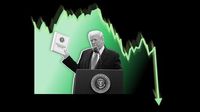Wall Street experienced a catastrophic downturn on April 4, 2025, marking its worst crisis since the onset of the COVID-19 pandemic. The S&P 500 plummeted by 6% after China announced it would impose a 34% tariff on U.S. goods in retaliation for President Donald Trump’s recent tariff hikes. This dramatic response heightened fears of a full-blown trade war between the world’s two largest economies, leading to significant losses across global financial markets.
The Dow Jones Industrial Average suffered a staggering loss of 2,231 points, or 5.5%, closing at 38,314.86, while the tech-heavy Nasdaq composite fell 962.82 points, or 5.8%, ending over 20% below its record high set in December 2024. In just two days since Trump announced sweeping tariffs on April 2, 2025, the S&P 500 companies have collectively lost $5 trillion in market value, surpassing the previous record decline of $3.3 trillion during the early days of the pandemic in March 2020.
Despite a better-than-expected U.S. jobs report released the same day, which indicated that employers had added 228,000 jobs in March, the market could not stabilize. The unemployment rate ticked up slightly to 4.2%, but analysts noted that the positive job data did little to alleviate the market's concerns over escalating trade tensions. Bill Adams, chief economist at Comerica Bank, commented, "The jobs report provides little comfort with the stock market puking out the last year’s gains in the last two days."
China's retaliation came swiftly after the U.S. imposed a 34% tariff on its imports, a move that Beijing labeled as “inconsistent with international trade rules.” This tit-for-tat escalation has led many to question the potential for a global recession, with J.P. Morgan analysts raising the likelihood of an economic downturn to 60%, up from 40% previously. The firm also predicted that if the recession occurs, the unemployment rate could rise to 5.3%.
On Wall Street, nearly all stocks in the S&P 500 index saw declines, with only 14 companies managing to stay afloat amid the turmoil. Companies heavily reliant on Chinese markets were particularly hard hit. DuPont’s stock dropped 12.7% following an announcement that Chinese regulators would launch an anti-trust investigation into its operations in China. Similarly, GE Healthcare, which received 12% of its revenue from China last year, saw its shares fall by 16%.
As the crisis unfolded, oil prices also took a hit, with crude oil settling at its lowest level since 2021. Brent crude futures fell 6.5% to $65.58, while U.S. crude futures dropped 7.4% to $61.99. These declines in commodity prices raised concerns about the broader implications for economic growth, as analysts warned that the trade war could hinder global economic recovery.
Federal Reserve Chair Jerome Powell acknowledged the potential impact of the tariffs, stating that they are “larger than expected” and could lead to increased inflation and slower growth. He emphasized the need for the Fed to keep long-term inflation expectations anchored, suggesting that the central bank may be hesitant to cut interest rates, which could further fuel inflation.
Despite the market chaos, President Trump remained defiant, asserting on social media that “MY POLICIES WILL NEVER CHANGE.” He characterized the current situation as a necessary measure to restore American manufacturing jobs, comparing the economic challenges to a medical operation. "For investors looking at their portfolios, it could have felt like an operation performed without anesthesia," said Brian Jacobsen, chief economist at Annex Wealth Management.
Trump’s trade policies have not only garnered support from his base but have also drawn criticism from various sectors. Some conservative media figures have expressed concerns about the long-term consequences of the tariffs, while others, like Secretary of State Marco Rubio, have attempted to downplay the negative effects on the economy.
As the financial markets reacted to the unfolding events, analysts and investors alike are left grappling with the uncertainty of how long the tariffs will remain in place and what further retaliatory measures might be taken by other countries. The potential for negotiations remains, with Trump suggesting he plans to meet with Vietnamese officials to discuss tariff reductions.
In the wake of these developments, the global stock markets reflected similar trends, with Germany’s DAX losing 5%, France’s CAC 40 dropping 4.3%, and Japan’s Nikkei 225 falling 2.8%. The Cboe Volatility Index surged to 45.31, indicating heightened market anxiety.
Overall, the situation remains fluid, with many investors opting to flee to the safety of government bonds amid fears of a looming recession. The yield on the benchmark U.S. 10-year Treasury note fell to 3.933%, while money market futures began pricing in cumulative rate cuts of up to 110 basis points from the Fed by the end of the year.
As the implications of Trump’s tariffs continue to unfold, the future of the U.S. economy and global trade relations hangs in the balance, leaving many to wonder how the administration will navigate the turbulent waters ahead.






